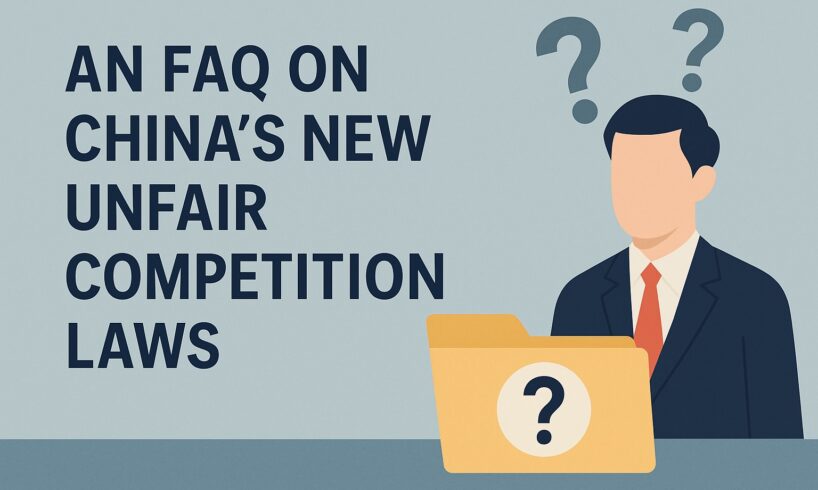
This post follows our comprehensive analysis of the 2025 AUCL reforms in “China’s 2025 AUCL: Executive Liability and Global Reach.” If you haven’t read it yet, start there. It explains the law’s long-arm reach, new personal liability for executives, and why compliance must now be global.
General Overview
1. What is the Anti-Unfair Competition Law (AUCL)?
The AUCL is one of China’s two cornerstone competition statutes, alongside the Anti-Monopoly Law. It governs market conduct rather than structure, targeting practices such as commercial bribery, false advertising, trade secret theft, commercial defamation, and market manipulation. The 2025 revision is the most consequential since 2017.
2. When does the revised AUCL take effect?
It takes effect October 15, 2025, following its passage by the National People’s Congress Standing Committee on June 27, 2025. Companies had approximately 110 days to prepare.
3. Why is this revision so significant?
Three key reasons: extraterritorial reach, personal liability for executives, and comprehensive digital economy regulation. The new AUCL regulates data, algorithms, and platform conduct while holding individuals financially accountable for violations.
4. Does this law apply if we have no operations in China?
Yes. Article 40 establishes extraterritorial jurisdiction. If your company’s activities anywhere in the world disrupt competition in China or harm Chinese entities or consumers, you face potential AUCL enforcement. This includes data scraping, digital advertising, e-commerce activity, and competitive intelligence.
5. How is the AUCL different from the Anti-Monopoly Law (AML)?
The AML targets monopolistic behavior such as price-fixing and abuse of dominance. The AUCL focuses on unfair conduct such as bribery, deception, and data manipulation. A company can violate both laws simultaneously.
Extraterritorial Jurisdiction: How China Enforces Beyond Its Borders
6. What does “extraterritorial jurisdiction” mean in practice?
Chinese regulators can investigate conduct that happens entirely outside China if it impacts the Chinese market. Examples include:
A German firm scraping data from Chinese platforms using overseas servers.
A U.S. tech company whose algorithms distort Chinese consumer choices.
A Japanese intermediary bribing Chinese officials through Hong Kong.
The key link is harm to Chinese interests, not physical presence.
7. How will China enforce the AUCL against foreign companies?
Expect enforcement through:
Investigations of Chinese subsidiaries or local partners.
Blocking market access or revoking business licenses.
Fines or confiscation of illegal gains.
Cross-border cooperation with other regulators.
Criminal referrals in serious cases.
Publicized actions that damage corporate reputation.
8. What types of foreign conduct are most at risk?
Data scraping, unauthorized keyword advertising, deceptive competitive intelligence, coercive platform practices, and commercial bribery involving Chinese entities, even when conducted abroad.
9. Can China realistically enforce against companies with no local presence?
Yes. China enforces through four main mechanisms:
Actions against subsidiaries or affiliates.
Market access restrictions and license denials.
Cross-border regulatory coordination.
Public enforcement designed to deter future violations.
Even without direct fines, reputational and strategic costs can be significant.
Executive Personal Liability and Penalties
10. Who faces personal liability under the AUCL?
Legal representatives, senior executives with decision-making authority, and individuals directly responsible for commercial bribery. This includes both China-based personnel and foreign managers overseeing China-related operations.
11. What are the penalties for individuals?
Fines up to RMB 1 million (about USD 140,000) and confiscation of illegal gains. Corporate fines can reach RMB 5 million. In serious cases, criminal referrals are possible.
12. I’m a U.S.-based executive overseeing China operations. Could I still be liable?
Yes. Liability depends on your role, not your location. You can be held accountable for authorizing or failing to prevent bribery that affects China, even if you have never been there.
13. How can executives reduce personal risk?
Adopt and enforce strict anti-bribery policies.
Require pre-approval for third-party payments.
Maintain clear documentation of compliance decisions.
Conduct enhanced due diligence on intermediaries.
Ensure D&O insurance covers China exposure.
Obtain counsel before approving questionable expenditures.
14. Will “I didn’t know” be a valid defense?
No. Regulators assess whether an executive should have known; ignorance, weak oversight, or deliberate blindness will not shield liability. Documentation of diligence and supervision is essential.
Digital Compliance: Data Scraping, Algorithms, and Platform Rules
15. Which digital practices are now prohibited?
Data scraping that circumvents technical protections.
Fake engagement such as fabricated orders or reviews.
Algorithmic manipulation that misleads consumers.
Coercive platform behavior that forces below-cost pricing.
Unauthorized keyword use that causes brand confusion.
Malicious return campaigns to harm competitors.
16. What about web scraping for market research?
Legal only if limited to publicly available data, complies with robots.txt, and avoids circumvention or deception. Scraping non-public data, bypassing logins, or ignoring platform terms violates the AUCL and may also breach China’s data scraping regulations.
17. We run an e-commerce platform. What are our obligations?
Platforms must ensure:
Fair and transparent trading rules.
Freedom for merchants to sell across platforms.
No below-cost or coercive pricing.
Complaint mechanisms for unfair conduct.
Active monitoring for fake reviews or transactions.
18. What are “water armies,” and why are they relevant?
They are hired individuals or bots generating fake reviews or attacks on competitors. The AUCL explicitly bans both hiring and participating in such schemes.
19. How does the AUCL interact with China’s Data Security Law (DSL) and Cybersecurity Law (CSL)?
These regimes overlap. The AUCL punishes unfair competition involving data misuse, while the DSL and CSL regulate data security and cross-border transfers. A single act, such as unauthorized scraping, can violate all three. Companies must meet the strictest combined standard.
20. Are social media handles and app names protected?
Yes. The law now protects digital identifiers such as handles, app names, and store names against confusing imitation. Register them as IP and monitor for misuse.
Commercial Bribery and Market Conduct Violations
21. What counts as commercial bribery?
Offering or accepting anything of value to influence a business transaction: money, gifts, travel, jobs for relatives, unrecorded rebates, or fake consulting fees. Both givers and recipients are liable.
22. How has the law changed?
Both sides (giver and receiver) can be penalized.
Corporate fines increased from RMB 3 million to 5 million.
Executives face personal fines up to RMB 1 million.
23. Are gifts and entertainment always bribes?
Not necessarily. Context matters: value, intent, documentation, company policy, and the recipient’s role. Gifts to officials face the highest risk. Proper accounting and transparency are essential.
24. What about third-party agents and distributors?
You are liable for their actions. Conduct due diligence, require contractual compliance clauses, audit transactions, train regularly, and terminate noncompliant intermediaries.
25. What if a payment is legal under my home country’s laws?
It does not matter. If it violates the AUCL and affects China, Chinese law governs. Facilitation payments and unrecorded commissions often breach both Chinese and foreign standards.
Abuse of Advantageous Position
26. What is “abuse of advantageous position”?
Large enterprises cannot exploit financial, technological, or market advantages to impose manifestly unreasonable terms on smaller partners, especially regarding payment timing or liability.
27. How does this differ from “abuse of dominance” under the AML?
Abuse of dominance concerns overall market power, while abuse of advantage concerns one-sided relationships. The AUCL focuses on fairness between specific counterparties, particularly SMEs.
28. What business practices create risk here?
Examples include excessive payment delays, below-market pricing, unilateral contract changes, unjustified penalties, and cost-shifting to weaker suppliers.
29. Is “abuse of advantageous position” similar to unfair contract terms in other jurisdictions?
Yes. It resembles unfair contract doctrines in EU and Japanese law, targeting disproportionate bargaining power rather than monopoly control.
Compliance and Enforcement
30. Who enforces the AUCL?
The State Administration for Market Regulation (SAMR) leads enforcement, with support from the Cyberspace Administration of China, MIIT, the Public Security Bureau, and industry regulators.
31. What penalties apply to AUCL violations?
Commercial bribery: up to RMB 5 million for companies and RMB 1 million for individuals.
Digital misconduct: fines, confiscation, suspension.
General violations include administrative penalties, license revocation, civil suits, and public disclosure.
32. Can private parties sue under the AUCL?
Yes. The AUCL supports both government enforcement and private lawsuits by harmed competitors or consumers. Civil and administrative actions can occur simultaneously.
33. Which industries face the most scrutiny?
E-commerce, digital advertising, AI and data analytics, pharmaceuticals, technology platforms, and financial services. Enforcement will target visible players first.
34. Will there be a grace period?
No. The June–October window was the grace period. Expect early enforcement against major domestic and foreign violators to set examples.
35. Is there a statute of limitations for AUCL violations?
Yes. Administrative actions are generally limited to two years from when the regulator learns of the violation, although serious cases can extend this period.
36. Can companies appeal SAMR penalties?
Yes. Companies can seek administrative reconsideration or judicial review within statutory deadlines.
Practical Compliance Steps
37. What should companies do immediately?
Immediate priorities:
Risk assessment: Conduct a full AUCL audit.
Policy updates: Revise anti-bribery and data practices.
Contract review: Examine payment terms and digital marketing.
Ongoing measures:
Implement reporting and whistleblower channels.
Conduct regular internal audits.
Consult counsel for readiness assessments.
38. What should an anti-bribery policy include?
Clear prohibitions, definitions, thresholds, third-party vetting, approval and recordkeeping systems, reporting protections, disciplinary measures, and annual training. Include personal-liability warnings.
39. How often should companies train employees?
At onboarding, annually, and as needed when regulations change. Document attendance and testing to demonstrate compliance diligence.
40. Should we conduct internal audits?
Yes. Focus on payments, third-party relationships, digital conduct, and contract terms. Whenever possible, conduct under attorney-client privilege.
41. What if we discover a potential violation?
Stop the conduct, engage counsel, preserve records, investigate thoroughly, remediate harm, and consider voluntary disclosure. Early corrective action can mitigate penalties.
42. Do we need China-specific policies?
Yes. Adapt global frameworks to local standards: use RMB thresholds, address “water armies” and platform behavior, issue bilingual policies, and align with current enforcement priorities.
43. What role should our China subsidiary play?
Lead implementation, monitor local risks, liaise with regulators, report to HQ, deliver staff training, manage local complaints, and coordinate with global compliance leadership.
Specific Scenarios
44. We use competitor keywords in online ads. Is that a problem?
Yes, if it causes confusion. Using another company’s brand as a keyword to attract consumers violates the AUCL. Remove problematic terms and consult counsel.
45. We pay commissions to Chinese sales agents. What should we check?
Ensure legitimate purpose, documentation, due diligence, anti-bribery clauses, and regular audits. Many “commissions” disguise bribery.
46. We have minimal China exposure. Should we care?
Yes. Even limited data collection, customers, suppliers, or partnerships can trigger jurisdiction. Compliance readiness now prevents major risk later.
47. We acquired a Chinese company. What should we review?
Investigate historical violations, align policies, audit intermediaries, check contract terms, train employees, and monitor integration. Successor liability applies.
48. We’re considering entering China. Should we wait until after October 15?
No. Begin compliance preparation now. Waiting could delay operations or attract regulatory attention during the law’s rollout phase.
49. Do joint ventures face different AUCL obligations than WFOEs?
No. The AUCL applies equally to domestic and foreign-invested entities. However, enforcement may consider the joint venture’s governance and control structure.
Final Thoughts
The 2025 AUCL is a structural shift in how China governs market conduct, data, and executive accountability. Companies with any connection to China must treat AUCL compliance as a global operational requirement, not a regional checkbox.
For a detailed enforcement trend analysis, see our companion post: China’s 2025 AUCL: Executive Liability and Global Reach.





